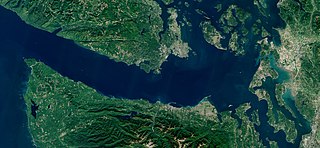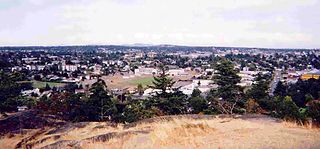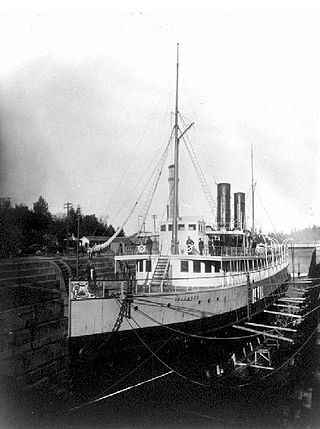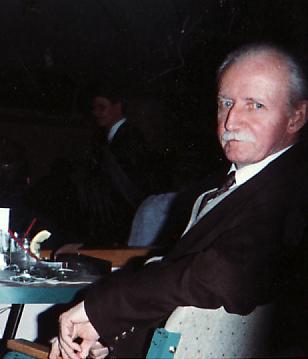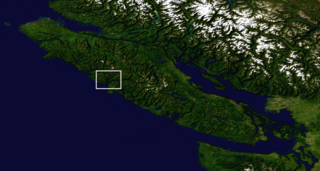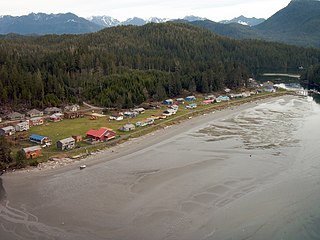Teaching and consulting
Initially returning to Victoria High School as teaching staff, Gough became Lecturer at Western Washington University in Bellingham, Washington, and co-director of the Centre for Pacific Northwest Studies. From 1972 to 2004 in the history faculty at Wilfrid Laurier University, Waterloo, Ontario, he was named associate professor, then Professor and University Research Professor. [6] He was founding coordinator of Canadian Studies at Laurier [7] and served as coordinator of Interdisciplinary Studies and Assistant Dean of Arts. [8] The material in a series of public lectures he organized was published with his introduction as In Search of the Visible Past. [9]
Gough was asked to prepare a historical legal claims dossier for the Tribal Council of the Nuu Chah Nulth in the Meares Island case (Moses Martin et al. v H.M. the Queen) in 1985 [10] and later, on behalf of the U.S. Department of Justice, to prepare materials on the Alaska inland waters case, Alaska v the United States of America (2005). [11]
His Great Lakes shipwrecks research led to involvement with HMCS Haida and him becoming the ship's official historian. Gough was advisory editor to Macmillan Publishing for World Explorers and Discoverers (1992) [12] and was editor-in-chief of the magazine American Neptune based at the Peabody Essex Museum in Massachusetts (1997–2003). [13]
At his retirement from WLU after thirty-three years, Gough was appointed Professor Emeritus. [14]
Awards and medals
Barry Gough and his writings have received honours, awards and prizes in the United States, the U.K., Spain and Canada. [18]
The British Maritime Foundation announced in November 2015 that Pax Britannica: Ruling the Waves and Keeping the Peace before Armageddon won the Mountbatten Literary Award 2015 for best literary contribution to the understanding of the importance of the seas. [19]
The highest award bestowed by the Washington State Historical Society, the Robert Gray Medal for lifetime achievement, was given to Gough in September 2016. [18] [20]
The Naval Association of Canada presented Gough with the 2019 Admirals’ Medal, bestowed upon individual Canadians in recognition of his lifetime achievement as a global maritime and naval historian "through some thirty major volumes and numerous articles, ... a body of work which has earned him international acclaim as a Canadian scholar of the highest order." [21]
A life member of the Society for the History of Discoveries, Gough was in November 2019 named a Fellow of the Society "for his many outstanding publications in Canadian and British imperial and naval history; for his fine record of teaching and mentoring students, particularly at Wilfrid Laurier University; and for his contributions to the scholarly community of imperial, international and maritime historians." [22]
Gough has received the Psi Upsilon Distinguished Service Alumnus Award, the Wilfrid Laurier University Alumni Hoffmann-Little Award for Outstanding Teaching, [23] [24] and the Distinguished Alumni award in 2019 from the University of Victoria. [25]
For civic contributions in both Ontario and British Columbia, he received the Queen Elizabeth II Golden Jubilee Medal. [26]
In November 2014, Gough received the Maritime Museum of B.C.'s 2014 SS Beaver Medal for Maritime Excellence. [27] [28]
Prizes have included the medals, awards and honourable mentions from a number of organizations: the North American Society for Oceanic History, [29] the Writers Trust of Canada Non-Fiction Prize. [30]
The Keith Matthews Award recognizes outstanding publications in the field of nautical research. When Possessing Meares Island won it in 2022, it was the fourth time Gough's books had won the award. [31]
Published works
Gough's dissertation, the basis of his first book, argued that British Columbia owed its existence to British sea power, that the Hudson's Bay Company was not the only agent in the commercial and political project of creating British Columbia's boundaries. [32] His investigations of early navigation in the Strait of Juan de Fuca and Strait of Georgia resulted in publication of Charles Duncan's long-neglected plan and elevation of Cape Flattery and Fuca's Pillar, charted by Duncan in August 1788 and first published in 1790. [33] "I've always felt the seas were blindsided in the writing of Canadian history, and I have made it my own particular calling to turn that around," Gough said in 1994. [34]
His 1997 account of Sir Alexander Mackenzie's overland explorations to the Arctic and Pacific coasts, First Across the Continent, continues as a central contribution to the study of North American exploration in the 18th and 19th centuries. [35] It is an account of the explorer's journey to the Pacific following indigenous pathways, guided by their knowledge and by European navigational science. [36]
In The Elusive Mr. Pond, Gough studied the soldier, fur trader and explorer Peter Pond, historically important in pushing northwest into the Mackenzie River basin and establishing the North West Company.
Pax Britannica in 2014 explored the intersection of British naval reach and the guarding of imperial commerce during the post-Napoleonic century. [37] [38]
Churchill and Fisher: Titans at the Admiralty (2017) received acclaim as an inquiry into the role of personality in the making of history: the administration of the Royal Navy in the Great War by First Sea Lord Admiral Sir John ("Jacky") Fisher and his young political master, First Lord Winston Churchill. [39] In The Times Literary Supplement, Jan Morris wrote: "This enthralling book by an eminent Canadian naval historian is a work of profound scholarship and interpretation…. Barry Gough has himself heightened the book's sense of personal drama by surrounding his central characters with powerful expositions of the state of the world around them." [40] James Wood in The Ormsby Review leads attends to Gough's accounts of the struggles within the Admiralty and British Cabinet in formulating strategy and policy for war and the "bitter complications" of Churchill's and Fisher's fall from power. [41] The Australian Naval Institute forum noted an approach in which the author "distilled and weighed the rancour, political intrigue, strategic and operational challenges and the (mostly) dismal record of the war at sea up to Jutland. The well-known politicians and admirals return to life with all their proclivities – admirable and less so." [39] One military-website commentator, observing that Gough writes "history as literature," says this "places Dr. Gough in a distinguished company of historians who are also great and readable writers. Sir Steven Runciman, Barbara Tuchman and Sir Winston Churchill come to mind." He adds this is "likely to remain the definitive work on this subject for years to come." [42]
The following year, research in Spanish and English archival sources became the 2018 book by Gough and Charles Borras, The War Against the Pirates: British and American Suppression of Caribbean Piracy in the Early Nineteenth Century, which examines the roots of piracy in those seas and how its suppression laid the foundation for the decline of the Spanish empire in the Americas. [43]
The third edition of the Historical Dictionary of Canada, edited by Stephen Azzi and Barry M. Gough, was published in April 2021. [44] This carries forward Gough's work on the 1999 original edition and 2010 second edition.
Possessing Meares Island won the 2021 Lieutenant Governor's Medal for Historical Writing, announced at the 2022 conference of the British Columbia Historical Federation. [45] It was a finalist for the BC and Yukon Book Prizes' Roderick Haig-Brown Regional Prize, [46] the 2022 BC Book Awards' George Ryga Award for Social Awareness in Literature, [47] the J.W. Dafoe Foundation's John W. Dafoe Book Prize [48] and the 2022 City of Victoria Butler Book Prize. [49] Gough's account of the evolving Meares Island situation and his research participation in it won the Keith Matthews Award for Best Book at the 2022 AGM of the Canadian Nautical Research Society. The judges noted that the book links "early maritime history, Indigenous land rights, and modern environmental advocacy in the Clayoquot Sound region" and "connects 18th century Indigenous-colonial trade relations to more recent historical upheavals and bridges the gap between centuries…." [50] The North American Society for Oceanic History (NASOH) in June 2022 awarded the book the John Lyman Award in Canadian Naval and Maritime History. [51] Dave Obee, editor-in-chief and publisher of the Times Colonist, described the Meares Island book as "a superb examination of a rather small location that is highly significant to British Columbia as a whole." Obee commented that the book brought together Indigenous history, maritime history, land rights and environmental issues, and that it would be hard to consider any one element without the others. [52] Maryland's William S. Dudley wrote that the author shows how the understanding of the word "possessing" changed "depending on which culture and at what period of time. It is also a concept that can exist simultaneously in the minds of concerned people, whether they are Indigenous, white traders, modern logging corporations, environmentalists, historians, or tourists." [53] Aimee Greenaway of British Columbia History interviewed Gough about the initial legal researches and how the "complicated story" evolved, one of "multi-layered, multi-disciplinary situations" with roots back hundreds of years that affect present-day developments. [54] Jason Colby commented that in tracking the consistent Indigenous presence on and control of Meares Island, Gough did "an exemplary job of showing how the case both reflected and contributed to changing the balance between federal and provincial views of native rights in Canada." [55]
The Curious Passage of Richard Blanshard, First Governor of Vancouver Island sets out the circumstances converging on the southern tip of Vancouver Island as the first governor of the colony arrived in March 1830. Gough gathers what's known of Blanshard's life and, around that, details the complicated events of the post-boundary settlement era in the colony. "Unpaid, suffering from malaria and stymied by James Douglas of the Hudson’s Bay Company, the first colonial governor of Vancouver Island still managed to establish the government on Vancouver Island." [56] Along with official duties that included handling labour strife up-Island, this "gentleman capitalist" was partly responsible for the skilled labour required to build forts, harbours, and housing in the fledgling colony. Blanshard returned to England, married, and regained his health. Eventually reporting in London to an 1857 Select Standing Committee, Blanshard answered their 260 questions about Vancouver Island having been made an unwelcome place for settlers and "took his revenge on Douglas and the company, testifying to the corruption under their rule." [57] The book won honourable mention for the BC Historical Federation Historical Writing Awards in May 2024. [58] It has been closely evaluated by Michael Ledger-Lomas in the Literary Review of Canada [59] and Dave Flawse and Aimee Greenaway have each posted long interviews with the author about Blanshard's story. [60] [61]

